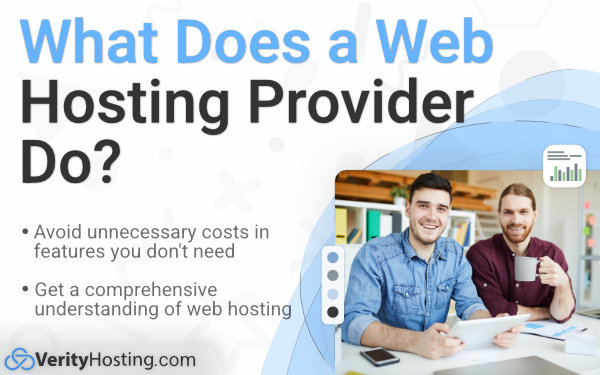
Do I Need a Website Manager
Learn what web hosting is and how to choose the best hosting provider for your next project.
Need help managing your small business website? click here
When it comes to your website's performance and success, the right hosting plan can make all the difference. But how do you know when it's time to level up?
In this article, we'll unravel the signs that indicate it's time to upgrade your hosting plan. Whether you're experiencing slow loading times, frequent downtime, or a growing need for more control and support, we've got you covered.
Get ready to discover the pivotal point when upgrading your hosting becomes necessary. Ensuring your website runs seamlessly, keeps up with demand, and propels your online presence to new heights.
Don't let your hosting hold you back - let's explore when to take the leap and level up!
Let's do a quick review of the different types of hosting so you can make an informed decision on upgrading your website to the next level.
For example, if you are using a standard shared hosting account and need more support, you may want to look for a good Managed Hosting provider.
Shared Web Hosting is a popular and cost-effective hosting option where multiple websites are hosted on a single physical server. Websites share server resources with other users, such as CPU, RAM, and storage.
Shared hosting plans are the most budget-friendly option, making them suitable for small websites or individuals on a tight budget.
Shared hosting does come with some limitations. Shared resources can result in slower performance and occasional resource limitations, especially during peak traffic times.
Users have limited control over server settings and software installations, as they share the server environment with other users.
VPS hosting involves dividing a physical server into multiple virtual servers, providing users with dedicated resources and a more isolated hosting environment. Each virtual server operates independently and can have its own operating system (OS) and server settings.
With dedicated resources, VPS hosting offers better performance and faster loading times than standard shared hosting. Users have more control over server settings, software installations and can customize the server environment to meet their specific requirements.
VPS hosting allows users to scale their resources as needed, quickly upgrading CPU, RAM, and storage to accommodate growing websites or applications.
Each virtual server operates independently, providing higher security and isolation from other users on the same physical server.
Managed web hosting combines the benefits of shared hosting with additional management services.
Managed Web Hosting is an ideal option for individuals or small businesses that require professional assistance and want to focus on their core activities rather than managing their websites.
Advantages for Small Businesses: Managed hosting providers offer dedicated customer support, assisting users with technical issues, troubleshooting, and performance optimizations.
Website Management: Managed hosting providers handle website setup, software installations, updates, and backups, ensuring smooth operation and minimizing downtime.
Scalability: Managed Hosting plans often provide scalability options, allowing businesses to easily accommodate increased traffic or expand their online presence.
Improved Security: Managed hosting providers implement robust security measures, including proactive monitoring, firewalls, and malware scanning, to protect websites from threats.
Dedicated Web Hosting provides users with an entire physical server dedicated solely to their website. This hosting option offers the highest level of performance, control, and customization.
Advantages over Shared and VPS Hosting:
Dedicated hosting ensures optimal performance and resources, as the entire server is dedicated to a single website or application.
Users have complete control over server settings, OS selection, software installations and can tailor the server environment to meet their specific needs.
Dedicated hosting provides enhanced security measures, allowing users to implement strict access controls, firewalls, and security protocols.
Dedicated hosting is suitable for resource-intensive websites, applications, or businesses with high traffic volumes.
Importance of Server Settings and OS Management:
Server settings and OS management play a crucial role in hosting environments. With shared hosting, users have limited control over these aspects, while VPS and dedicated hosting offer greater flexibility and customization options.
Proper server settings and OS management enable users to optimize their websites for performance, security, and specific software requirements. It allows customization of server configurations, software installations, and security measures to align with the unique needs of the website or application, ultimately enhancing user experience and ensuring efficient operation.
Suppose your website experiences a significant increase in traffic or requires more server resources to handle its growing user base. In that case, it may be a sign that you have outgrown shared hosting.
Limited resources in shared hosting can result in performance bottlenecks, slow loading times, and poor user experience.
If your website consistently suffers from slow loading times, frequent timeouts, or lags in responsiveness, it indicates that the shared hosting environment is struggling to handle the resource demands of your website. Upgrading to a more robust hosting plan can provide the necessary resources and improve overall performance.
Shared hosting plans typically allocate a limited amount of server resources to each website. If your website frequently experiences downtime or encounters resource limitations, such as exceeding CPU or memory usage, it may be a clear indication that your current hosting plan is insufficient to support your needs.
As your website grows, it becomes more complex to maintain and optimize. If you find yourself struggling to handle server administration tasks, software updates, or resolving technical issues on your own, it may be time to consider an upgrade. Managed hosting plans offer expert support and take care of day-to-day website management tasks, allowing you to focus on your core business.
Not everyone has the technical knowledge or time to manage server settings, perform regular backups, or address security vulnerabilities effectively. If you lack the expertise or availability to handle these responsibilities, upgrading to a managed hosting plan can provide you with the necessary assistance and peace of mind.
If you value proactive monitoring, enhanced security measures, and regular backups to protect your website from cyber threats and data loss, shared hosting might not offer the level of security you require. Managed hosting plans often include robust security features, such as firewalls, malware scanning, and vulnerability assessments, ensuring your website stays safe and secure.
If your website relies on specific software or requires custom server configurations to operate optimally, shared hosting might limit your ability to make such customizations. Upgrading to a VPS or dedicated hosting plan provides greater control over server settings and allows you to tailor the environment to meet your application's unique requirements.
Certain advanced features or software installations might not be supported in shared hosting environments due to resource limitations or security restrictions. If your website requires specific software or advanced functionality that is not feasible in shared hosting, upgrading to a more flexible hosting plan can provide the necessary freedom for such installations.
If you anticipate significant growth or expect your website's resource needs to increase in the future, it's crucial to have a hosting plan that offers scalability and flexibility. VPS and dedicated hosting plans allow you to scale your resources as needed, ensuring your website can handle future growth and accommodate higher traffic volumes.
By recognizing these signs and evaluating your website's specific requirements, you can determine when it's time to upgrade your hosting plan. Upgrading to a more suitable hosting option will help ensure optimal performance, improved support, enhanced Security, and greater control over your website's server settings and OS.
Evaluate your website's current traffic levels and anticipate future growth. Consider whether your existing hosting plan can handle the expected increase in visitors. If you're experiencing frequent resource limitations or slow loading times due to high traffic, it's a clear indication that an upgrade is necessary.
Assess the resource demands of your website, including CPU processing power, RAM requirements, and storage capacity. Determine if your current hosting plan provides adequate resources to support your website's functionality and performance. Identify any resource-intensive applications or features that may require additional resources.
If your website relies heavily on multimedia elements such as videos, images, or large files, it may require more bandwidth and storage space. Assess whether your current hosting plan can efficiently handle the storage and delivery of these content types. Upgrading to a plan with higher bandwidth and storage capacity can ensure smooth content delivery.
Consider your budget and weigh the costs against the benefits of upgrading your hosting plan. Evaluate the potential impact of the upgrade on your website's performance, user experience, and business goals. Determine whether the benefits of improved speed, reliability, and support justify the associated costs.
If your website is a critical revenue-generating asset or a crucial part of your business strategy, investing in an upgraded hosting plan may be essential. Consider the potential impact of improved website performance, uptime, and user experience on conversion rates, customer satisfaction, and overall business growth.
Research and compare different hosting providers and their plans. Evaluate the features and specifications offered by each provider, such as server performance, uptime guarantees, security measures, and scalability options. Read customer reviews and testimonials to gauge the reputation and reliability of the hosting providers under consideration.
Ensure that the hosting provider offers reliable and responsive customer support. Assess the available support channels, such as live chat, phone support, or ticketing systems, and check for 24/7 availability. Prompt and knowledgeable customer support is crucial, especially during the migration process or when dealing with technical issues.
Before migrating to a new hosting plan, create a detailed migration plan to minimize downtime and ensure a seamless transition. Coordinate with the new hosting provider to schedule the migration at a low-traffic period. Prepare a backup of your website's files, databases, and configurations to avoid data loss during the migration process.
Verify the compatibility of your website and any existing applications with the new hosting environment. Check if your website's software, scripts, and plugins are compatible with the new hosting plan. Ensure that the required server settings, PHP versions, and database configurations align with the new hosting environment.
Take necessary precautions to back up your website's data before initiating the migration. It acts as a safeguard against any unforeseen issues during the transition. Additionally, implement security measures to protect your website during the migration process, such as implementing SSL certificates, firewalls, and security plugins.
By carefully evaluating these factors, you can make an informed decision about upgrading your hosting plan. Understanding your website's needs, budget constraints, researching hosting providers, and planning for a seamless migration will help ensure a successful transition to a hosting plan that meets your requirements and supports your website's growth.
Depending on your technical expertise and comfort level, you can choose to collaborate with your hosting provider or hire professional experts to assist with the migration process.
Hosting providers often offer migration services or have documentation available to guide you through the process. If you prefer professional assistance, consider hiring web migration specialists.
In conclusion, upgrading your hosting plan is a crucial step in ensuring the optimal performance, scalability, and Security of your website.
By recognizing the signs that indicate the need for an upgrade, such as outgrowing shared hosting, facing challenges in website management, and desiring more control over server settings, you can take proactive steps to enhance your online presence.
It is essential to evaluate your website's requirements, considering factors like traffic levels, resource demands, and customization needs.
Armed with this knowledge, you can make informed decisions about upgrading your hosting plan, aligning it with your specific goals and future growth projections.
The benefits of an upgraded hosting plan are numerous, including improved performance, better support, increased customization, and enhanced security measures.
Ultimately, upgrading your hosting plan empowers your website to deliver an exceptional user experience, support your business objectives, and adapt to the evolving needs of your audience.
All photos used have been curated by Verity staff

Verity Editorial Staff
The editorial staff at VerityHosting is a team of hosting experts with over 25 years of experience managing, monitoring, and maintaining hosting services for small businesses.
Get helpful small business tips from VerityHosting.com

Learn what web hosting is and how to choose the best hosting provider for your next project.

Learn why a reliable and efficient web hosting provider is crucial for businesses, bloggers, and website owners on today's internet.

One of the best-kept secrets in Hosting! Learn what Managed WordPress Hosting is and why it's such a great option for your small business.
Verity Hosting - Providing professional managed hosting services while being focused on helping our clients to build a successful business on the web and on mobile.